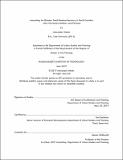Accounting for disaster : small business recovery in North Carolina after Hurricanes Matthew and Florence
Author(s)
Meeks, Alexander.
Download1140509310-MIT.pdf (4.624Mb)
Other Contributors
Massachusetts Institute of Technology. Department of Urban Studies and Planning.
Advisor
Karl Seidman.
Terms of use
Metadata
Show full item recordAbstract
In an era of climate change, the rural, coastal plains of North Carolina might foretell the increased economic precariousness of coastal communities beset by stronger hurricanes and more frequent flooding. In 2016, Hurricane Matthew flooded much of North Carolina's southeastern region, inundating thousands of homes and businesses. Two years later, Hurricane Florence interrupted the state's recovery, precipitating even greater damage. Little academic work focuses on the state's recovery from the two storms, and none to date tracks the recovery of its small businesses. These businesses are important sources of employment and wages in the state's communities, yet compared to households and public facilities, they qualify for fewer sources of economic relief, and almost all of that relief consists of debt. These businesses also already bear the brunt of ongoing negative trends: increasing economic stratification between small and large firms nationwide as well as sustained rates of rural depopulation and divestment. I focus on the supply and use of small business recovery capital in order to diagnose unmet need after the hurricanes and make recommendations to foster business recovery in North Carolina after these and future disasters. On the capital "supply side," I describe slow, sometimes arbitrary and occasionally risky federal disaster recovery programs geared toward small businesses. These contrast with the relatively sophisticated, efficient system of capital absorption below the state level, which pivots around a network of distributed, community-based small business development centers and lending intermediaries. On the capital "demand side," I theorize the vulnerability of small businesses and seek to understand their financial and operational decision-making through interviews. Small businesses, which are expected to recover on their own financial merits through insurance, debt financing, and savings, must also rely on factors well beyond their control: the availability of affordable and rapid debt capital, the quick resurgence of local spending after a disaster, and the public resolution of market failures through limited grant funding. Absent significant improvements in the penetration of insurance, disaster credit, and hazard mitigation, these businesses will continue to face rising fixed costs, diminished access to credit, tighter operating margins, and a higher probability of failure.
Description
This electronic version was submitted by the student author. The certified thesis is available in the Institute Archives and Special Collections. Thesis: M.C.P., Massachusetts Institute of Technology, Department of Urban Studies and Planning, 2019 Cataloged from student-submitted PDF version of thesis. Includes bibliographical references (pages 139-153).
Date issued
2019Department
Massachusetts Institute of Technology. Department of Urban Studies and PlanningPublisher
Massachusetts Institute of Technology
Keywords
Urban Studies and Planning.